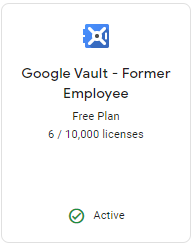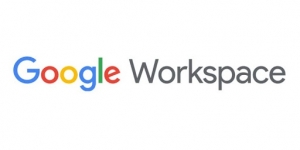Google Workspace: Vault Former Employee Licensing & Cost
 Coinciding with the announcement of the move to Google Workspace, Google also announced that Vault Former Employee, or VFE, licensing will deprecate and no longer be available. While Google is offering Archive User, or AU, licensing, the licenses will no longer be free. In this article we go into more detail on what VFE license are, Google workspace archive user license prices, and what options you have moving forward.
Coinciding with the announcement of the move to Google Workspace, Google also announced that Vault Former Employee, or VFE, licensing will deprecate and no longer be available. While Google is offering Archive User, or AU, licensing, the licenses will no longer be free. In this article we go into more detail on what VFE license are, Google workspace archive user license prices, and what options you have moving forward.
What are VFE licenses from Google?
 In G Suite, in order to preserve data in Vault for former employees, you needed to keep the user’s account active. As this could be expensive for many businesses, Google provided relief with free VFE licenses that maintain the archive without having to pay for the user account.
In G Suite, in order to preserve data in Vault for former employees, you needed to keep the user’s account active. As this could be expensive for many businesses, Google provided relief with free VFE licenses that maintain the archive without having to pay for the user account.
For customers that came to G Suite as former Postini customers, Google VFE licenses are a separate, free subscription. For other customers, VFE licenses were provided as additional, free G Suite Basic, Business, or Standard Licenses. Vault Former Employee, or VFE, licensing will deprecate and no longer be available. Below is the information and dates you need to know.
Note that the vast majority of customers with VFE licensing, particularly small and midsize businesses, are former Postini customers.
What are AU licenses and How Much Do They Cost?
In Google Workspace, Archive User licenses allow you to maintain your vault archive for past users without paying for a full Google Workspace license. Depending on your subscription, AU licenses will cost between $4 and $7 per user per month ($48-$84 per year). This is significantly less than the $18 to $30 per user per year to keep an active license.
As of this blog post AU licenses are only available with the Google Workspace Enterprise Plus subscription. We expect AU licensing to be added to Enterprise Standard and Business Plus subscriptions some time in 2020 Q1.
When do VFE licenses go away?
For Former Postini Customers:
The end date for VFE licensing for former Postini Customers has not been set. Google will provide these customers with at least 60 days notice before the licenses expire. By default these VFE licenses will automatically transition to paid AU licenses.
At this time, we do not expect these VFE licenses to end prior the addition of AU licenses to other Enterprise and Business subscriptions. As such, our best estimate is that this change will happen no earlier than 2020 Q3.
For non-Postini Customers:
The end date for non-Postini customers is December 31, 2020. At this time, VFE licenses will convert to paid AU licenses. Customers will need to move to the Google Workspace Enterprise Plus subscription for this to occur.
What Your Options Are for Google Workspace Archive User Licenses:
Non-Postini Customers
Non-Postini customers have until the end of the year to migrate data out of the VFE accounts to another location or service, or to prepare for the transition to Google Workspace Enterprise Plus and AU licensing. Both options involve cost, either labor and tools to move the data or new subscription fees. If you want to migrate your data out of VFEs, you have multiple options. The best option will depend on the number of users and amount of data.
Former Postini Customers
We recommend former Postini customers with VFE licensing begin their planning process now.
Since VFE licenses are a separate “product”, you can take advantage of our incentive discounts for moving from G Suite to Google Workspace before the end of the year.
Looking forward, you want to decide what VFE data you need or want to keep, and whether it is worthwhile to move the data or pay for the AU licensing when the transition happens.
Your Next Step:
The best way to move forward with Google Workspace archived user license cost decisions is to contact us and speak with one of our Cloud Advisors. We can help you assess your situation, discuss options and pricing, and pick the solution that best meets your requirements and budget.

 Last week, Google made one of the biggest announcements in the 12 year history of its business productivity suite history. G Suite is now Google Workspace. More than a name and branding change, Google Workspace represents a wholesale realignment of the productivity suite. Offering Business and Enterprise product tiers, each with multiple licensing and package options, Google Workspace is structured to match the way businesses are running today, and expect to run in the future.
Last week, Google made one of the biggest announcements in the 12 year history of its business productivity suite history. G Suite is now Google Workspace. More than a name and branding change, Google Workspace represents a wholesale realignment of the productivity suite. Offering Business and Enterprise product tiers, each with multiple licensing and package options, Google Workspace is structured to match the way businesses are running today, and expect to run in the future.